- Home
- Captain W E Johns
46 Biggles in the Gobi Page 2
46 Biggles in the Gobi Read online
Page 2
The Air Commodore's eyes were on Biggles" face. "Well, what do you think about it?"
" Is there any desperate urgency about a decision?"
"No, although obviously every day's delay is bound to make matters more serious for the refugees."
Biggles picked up a ruler and a large magnifying glass from the table and walked over to the map that covered the wall. Standing close, he studied it for some time in silence, occasionally using the ruler to plot courses or measure distances. Then he said: "The nearest point from which we might be allowed to operate seems to be Dacca, in Pakistan. It's almost directly south of the objective."
"Quite right," agreed the Air Commodore. "That would mean flying over the Himalayas and Thibet—the so-called Top of the World."
"The eastern approach could only be from Hongkong, which is not only farther away by some hundreds of miles but would mean flying over such thickly populated country that we couldn't hope to escape observation. My choice would be from the south, over Assam, Bhutan and Thibet, where anyone seeing us wouldn't pay much attention."
"You would have to fly over some of the worst country in the world."
Biggles shrugged. "' A forced landing either way would probably finish us. I'd rather ram a mountain than end up in a Chinese jail."
"What aircraft would you like?"
Biggles thought for a moment. "A Halifax would do it comfortably. I make the run about thirteen hundred miles each way. Petrol for three thousand miles should give us a fair margin. To be on the safe side, as we shouldn't have much of a load to carry on the way out, we could install a reserve tank. No doubt the Air Force could find us a Halifax."
"But that's a service machine," protested the Air Commodore. "I said the government couldn't be implicated."
"I believe quite a few Halifaxes have been sold for conversion to civil transportation," Biggles pointed out. "We should take most of the war load off to save weight. Some seating accommodation and a coat of paint should make the machine look as tame as a charabanc."
The Air Commodore looked at Biggles suspiciously. "What do you mean by most of the war load?"
"I was hoping you wouldn't ask that question," parried Biggles.
Raymond looked alarmed. "You can't carry guns. If you shoot somebody the fat will be in the fire."
Biggles nodded. "And if somebody shoots me, my fat will be in the fire.
I'd rather theirs than mine. Don't worry. I shan't shoot unless I'm shot at; but when I'm shot at I shoot back. It's just a bad habit of mine that I haven't been able to cure. We can always jettison our guns if we had to go down."
The Air Commodore looked doubtful. "I don't like it."
"Put it this way," argued Biggles. "If we're shot down, we shall be recognised as British and there'll be a row anyway. If we're not shot down there can't be a row because there will be no evidence. If the government is challenged it can say that it can't be held responsible for all the Halifaxes now floating loose. The thing is, therefore, not to be shot down: The best way of preventing that is to have a good gun with a good man behind it."
The Air Commodore frowned. "Why do you have to be so difficult?
Biggles looked hurt. "Me? Difficult? I like that. I'm the last man to want trouble. It's the other side that's making the difficulties. Surely you wouldn't expect any man in his right mind to jump unarmed into a den of ravening wolves? I must be crazy to offer to jump into the den at all, but I'm not that crazy."
"All right," consented the Air Commodore wearily. "Have it your own way.
But for heaven's sake watch what you're doing."
"Believe you me," replied Biggles warmly, "I shall be as watchful as a dove making for home through a sky stiff with buzzards."
"Then I can take it that you're prepared to go?"
"Of course I'll go. You knew I'd go. At least, I hope you did. I'd be pained if you thought I'd sit around flying an office desk while decent people are being hounded to death by a mob of fanatics waving red flags.”
"What are you going to do about landing when you get there?
"That's my big worry," admitted Biggles. "The problem will need some serious thought. But you'd better leave the operational details to me or we may get at loggerheads again. I"ll take this docket if you don't mind and get cracking on it."
"Is there anything I can do, apart from getting the Halifax?"
Biggles stroked his chin. "There's one thing, if it could be managed. How about getting hold of the fellow who brought in this news? I shan't be near Hongkong. He could be flown over here in a few days. He should be able to give us some local gen, such as possible landing grounds near the caves and the sort of weather we're likely to meet."
"It's summer in Central China now, so the weather should be good, if unpleasantly hot. But you should miss the howling winds that make life hell in the Gobi for most of the year."
Biggles nodded. "We can do without that," he said soberly.
"I'll see if I can get hold of this fellow. As you say, he may be able to help you to locate the objective, or give you a general picture of the country."
Biggles picked up the docket. "I'll see you again before I go, sir."
As the door closed behind him the Air Commodore shook his head dubiously and reached for another cigarette. But only he knew what he was thinking.
CHAPTER II OUTWARD BOUND
A FORTNIGHT later, under a serene sky ablaze with stars, a dun-coloured Halifax, displaying no insignia or registration marks, made a covert take-off from the parched airfield at Dacca, in Pakistan, and bored its way, climbing steadily, into the vague emptiness that lay to the north.
Ginger was beside Biggles in the cockpit, their faces ghastly in the eerie light reflected from the luminous dials on the instrument panel.
Algy occupied the forward gun turret and Bertie the tail, all places having been decided by drawing lots. The centre turret was not manned, but it could of course be filled in an emergency by leaving only one pilot in the cockpit. There were mobile machine guns in all three stations, and as there is a walk-way down the full length of the Halifax, places could be changed at any time.
The radio compartment, not being in use, was empty, but the navigator's room, easily accessible, was occupied by a figure as strange as ever sat at the chart table of a heavy bomber. He was a little man with a yellowish complexion and slanting eyes that were no more than slits in his face. This was Feng-tao, the Chinese priest, the man whose tragic news had been responsible for the expedition.
Actually, Feng-tao had been a disappointment, although, to be fair, this was through no fault of his. To start with, his knowledge of the English language was practically nil, so conversation had to be conducted through an interpreter. He was amiable, and willing enough to fly. Indeed, he was anxious to return to his friends. But he could tell them little or nothing they did not already know. As was to be expected, he knew nothing whatever about aviation, so his advice about landing possibilities—the chief reason for his presence—was not to be relied on. He was emphatic, however, about there being a lot of sand. This, it seemed, was mostly in the form of dunes, which, disconcertingly, moved about when the wind blew. Biggles was by no means sure that the priest would recognise the place from the air. However, there was a chance that his knowledge of local languages would make him a useful ally on the ground in an emergency. A parachute had been brought for him. Its purpose and method of employment had been explained, but he seemed so indifferent about its use that Ginger was quite certain that if ever he attempted to use it he would go straight into the ground like a brick.
Biggles was, of course, flying by dead reckoning, although a few possible landmarks had been noted—exceptionally high mountains, rivers, and Lhasa, the capital of Thibet, which lay close to their track. From this remote town one of the few roads that crossed Central Asia ran almost due north for five hundred miles before swinging away to the east for another thousand miles to join the Red Highway at Lanchow. Such landmarks had been memorised not
only from the map but from air reconnaissance survey photographs made available by the Air Ministry.
Biggles knew, as all experienced, pilots know, that the success or failure of a long-distance flight depends largely on the preparations made before the start; for which reason nothing that could be done had been left undone, Even so, as it is impossible to guarantee absolutely the reliability of any mechanical device, all those in the Halifax knew perfectly well—although they did not talk about it— that engine or structural failure of any sort, over such country as would be below them for the next five hours, could have only one ending. The same conditions would apply on the return passage.
The Halifax continued its long climb, for in front of it, and stretching for hundreds of miles on either side, were the mighty Himalayas, with many peaks reaching well above twenty thousand feet. Everest, the highest of them all, lay a full hundred miles west of their track, so it seemed unlikely that they would see it. Not that any of them particularly wanted to see it, for should they get off their course in bad visibility it would be a menace.
Beyond the Himalayas lay Thibet, a vast, little-known tableland, itself a maze of plains and valleys averaging sixteen thousand feet with ridges and peaks rising several thousand feet higher.
The reason why Biggles had chosen to make the flight by night was in order to escape observation from the ground, which might lead to interception in the air. In the ordinary way, that is, unless their presence was detected and reported, there seemed little risk of meeting other aircraft, military or civil. So he had timed his take-off to arrive over the objective at dawn, thus exposing himself in the minimum of daylight. A secondary reason was for visibility. From enquiries they had made there seemed less chance during the hours of darkness of being troubled by mist or cloud. Daylight would of course be required for finding the caves, and for the landing when they went down. This part of the operation, as Biggles had realised from the outset, would be the most difficult phase, and no definite decision had been made about it.
There had been long debates about this, culminating in a plan which, while it might involve more flying, would greatly reduce the risk of landing, when, as they all knew, the slightest mishap would inevitably be fatal.
Arriving over the objective they would examine the ground as closely as circumstances permitted. If a level area, free from obstructions, could be found within a reasonable distance of the caves, they would land.
Otherwise, Algy and Ginger would drop by parachute and search for a suitable site. If necessary, supposing there to be an area on which a landing strip could be made, they would muster the refugees, set them to clear it and mark it out. It was extremely unlikely that the aircraft could wait while this was being done. It might fly round for an hour, not more, although even this would be dangerous. Rather than wait longer Biggles would take the machine back to Pakistan and return a week later, a sufficient lapse of time, it was thought, for a landing-strip to be completed should the surface of the ground hold out any promise of this.
If there was no possible hope of ever getting down within many miles, then Feng-tao would be dropped, with a good supply of condensed food, and the project abandoned. There was just a chance that the refugees, with sufficient stores, might be able to make their way on foot to India, Burma or Hongkong.
Should it be decided to drop Algy and Ginger they would take walkie-talkie radio with them, but as the risks attached to its employment were evident it was only to be used in dire emergency. Alternatively they would have to rely on visual signals. In a word, the most dangerous part of the operation was still, literally as well as figuratively, in the air.
Actually, Biggles was hopeful about getting down. A close study of the best maps available, and these were rather better than he expected, showed that Tunhwang was beyond the great mountain plateaux, the so-called Roof of the World. It lay in a depression more or less surrounded by vast deserts. Deserts are not necessarily flat; nor are they always sandy. For a man who had lived his life among them Feng-tao was sadly vague. True, he said there was plenty of sand, much of it flat; but his idea of flat, in a wilderness of undulations, of dunes and water-worn ravines, might be only comparative. Even if there was level sand it might be soft, which would be not merely useless but dangerous, since it was likely to trip the machine and throw it on its nose. Even if this did not happen the wheels might sink, and becoming clogged, effectually prevent the aircraft from ever getting off again—a hazard well known in the Middle East, where more than one pilot, landing on flat but treacherous ground, has perished miserably.
The Halifax droned on through the cold night air. Overhead, the stars were a thing to wonder at. They filled the sky to reveal below, from horizon to horizon, a world of white, frozen sterility. But not until the disc of the moon rose clear was it possible to appreciate fully the awful beauty of the scene, a scene that could not have been more strange and remote had they been flying across the face of the moon.
It seemed impossible that the steaming jungles of India, which they had so recently left, could belong to the same world. On all sides now the unconquered monarchs of the Himalayas reared their mighty heads. Between them yawned glacier-filled chasms, sometimes with walls as sheer as if cut by an axe. As a spectacle it was sublime, unreal but terrifying, and instinctively Ginger found himself listening for any change in the monotonous drone of the engines on which their wings depended for support; for should they fail, the aircraft and its crew must disappear for ever, as utterly as a stone dropped in the deepest sea.
This fearful world of ice and snow seemed to go on for ever. Ginger, anxious for the scene to change, thought it never would. It fascinated yet appalled him. He couldn't tear his eyes away, and he found the strain of hanging poised between life and death exhausting. The machine was not always steady. Although it was flying at over twenty thousand feet there were times when the snow and ice looked uncomfortably close. Indeed, more than once, it was necessary to change course slightly to avoid a hoary-headed giant. On one occasion they passed between two, and for a minute diverted air-streams clutched like hands at the plane and threatened to drag it to destruction.
It was bitterly cold. Not for nearly two hours did the ground begin to show signs of falling away, and even then for some time isolated peaks stood like ghostly sentinels watching the passage of the intruder through their domain.
It was a relief when a cluster of lights showed for a little while far away on the port side. Not only was it with relief that Ginger gazed at them. For some reason he was astonished, for he had come to regard this section of the earth as uninhabited.
"Lhasa," said Biggles, and conveyed the information to the others over the intercom. "We're on our track," he added.
Another three quarters of an hour passed before he spoke again. Then, to Ginger, he said: "We should be crossing the road to Hanchow any time now.
I don't suppose it'll be much of a road, but it will probably be sunken and may cast a shadow. See if you can spot it. We don't really need it but it would serve to check our position."
Ginger did not succeed in finding the road, but he made out a river, which from his map he knew must be the headwaters of the Yangtze, which, after nearly four thousand miles, finally wanders into the China Sea.
Half an hour later the eastern sky shivered into the dawn of another day.
Never had Ginger been so glad to see the sun and a cloudless sky. As it turned slowly blue, and the aircraft began to lose height that was no longer required, he surveyed the terrain below and ahead with curiosity and interest, aware that he was gazing at the very centre of Asia, something that few western eyes had seen.
He knew from the documents relating to the case, which he had read, roughly what to expect, so he was not surprised to find that nothing stood out clearly from a background that all looked very much alike; a limitless expanse of undulating sand or gravel from which rose shapeless hills and mountain ridges of rock or sandstone. He noted some broad areas of what might have been sc
rub, or grass, or possibly marsh; but for the most part the ground appeared to be a desolate wilderness. There were no trees. He could not pick out anything that looked like a dwelling, or even the smoke of caravan fires, although the machine was still high for such details to be picked out even if they were there.
Still losing height, the engines doing little more than tick over, the Halifax cruised on.
After a time Biggles said: "We must be getting close. You might get Feng-tao to have a look round to see if he can identify anything."
Ginger went down to the navigation compartment to find the Chinaman blissfully sleeping. Waking him he indicated by signs what was required.
Feng-tao looked down; he looked long and hard; but Ginger soon perceived from the blank expression on his face that he was wasting his time. He gave him five minutes and then went back to Biggles. "He hasn't a clue,"

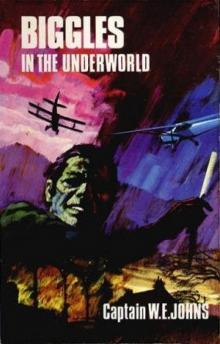 Biggles in the Underworld
Biggles in the Underworld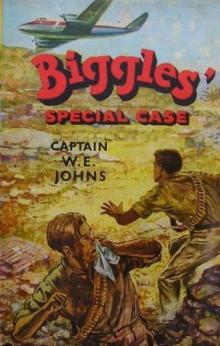 Biggles' Special Case
Biggles' Special Case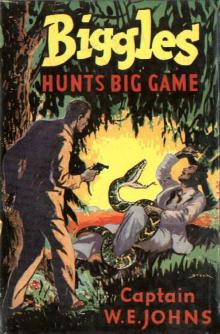 34 Biggles Hunts Big Game
34 Biggles Hunts Big Game 03 Now To The Stars
03 Now To The Stars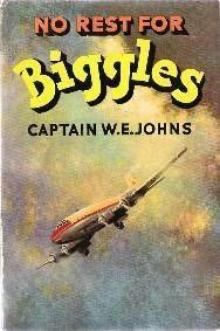 55 No Rest For Biggles
55 No Rest For Biggles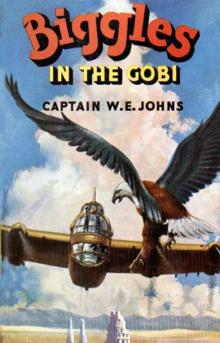 46 Biggles in the Gobi
46 Biggles in the Gobi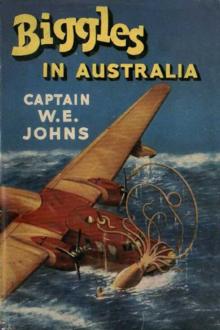 52 Biggles In Australia
52 Biggles In Australia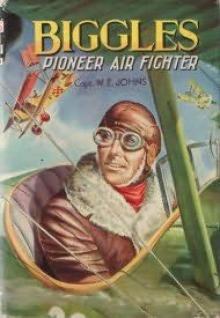 51 Biggles Pioneer Air Fighter
51 Biggles Pioneer Air Fighter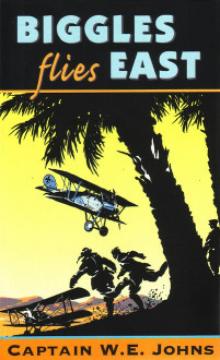 05 Biggles Flies East
05 Biggles Flies East 28 Biggles In Borneo
28 Biggles In Borneo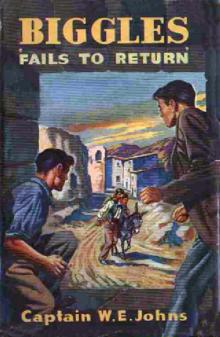 29 Biggles Fails to Return
29 Biggles Fails to Return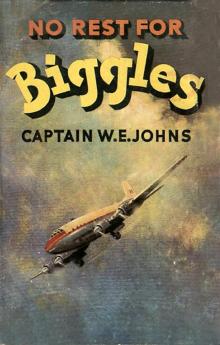 55 No Rest For Biggles (v2)
55 No Rest For Biggles (v2) Biggles Does Some Homework
Biggles Does Some Homework Biggles of the Camel Squadron
Biggles of the Camel Squadron 35 Biggles Takes A Holiday
35 Biggles Takes A Holiday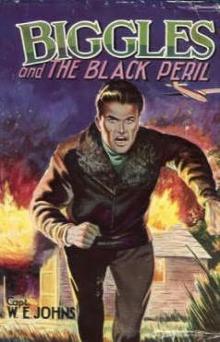 Biggles And The Black Peril (06)
Biggles And The Black Peril (06)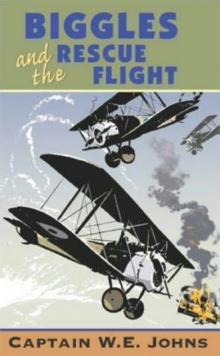 17 Biggles And The Rescue Flight
17 Biggles And The Rescue Flight Biggles Learns To Fly
Biggles Learns To Fly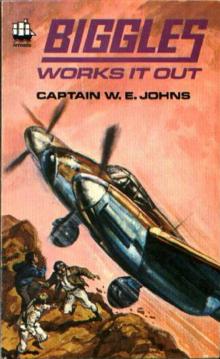 40 Biggles Works It Out
40 Biggles Works It Out 05 Biggles Learns To Fly
05 Biggles Learns To Fly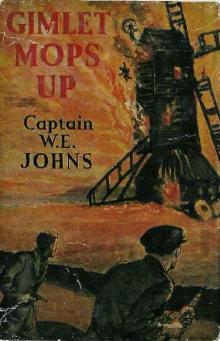 04 Gimlet Mops Up
04 Gimlet Mops Up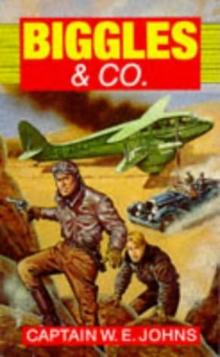 10 Biggles and Co
10 Biggles and Co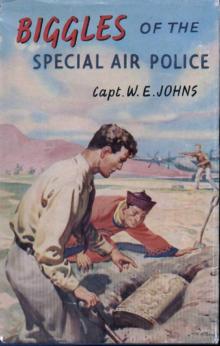 47 Biggles Of The Special Air Police
47 Biggles Of The Special Air Police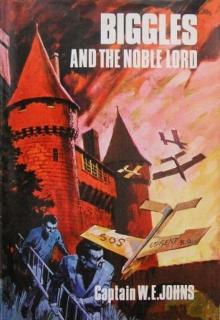 Biggles and the Noble Lord
Biggles and the Noble Lord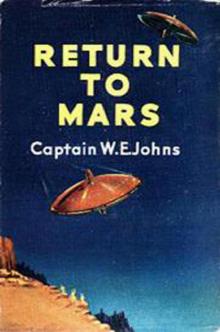 T2 Return To Mars
T2 Return To Mars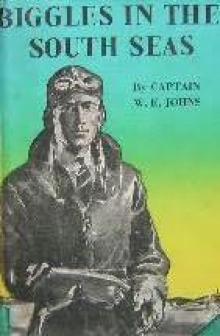 21 Biggles In the South Seas
21 Biggles In the South Seas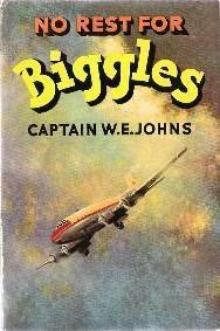 No Rest For Biggles
No Rest For Biggles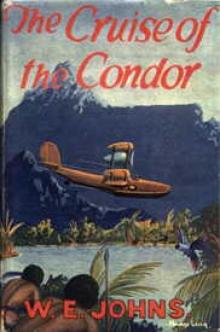 Biggles In The Cruise Of The Condor (02)
Biggles In The Cruise Of The Condor (02)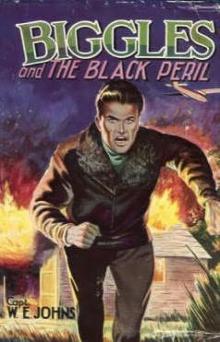 06 Biggles And The Black Peril
06 Biggles And The Black Peril Biggles and the Deep Blue Sea
Biggles and the Deep Blue Sea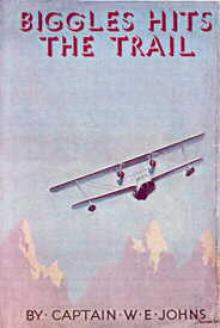 06 Biggles Hits The Trail
06 Biggles Hits The Trail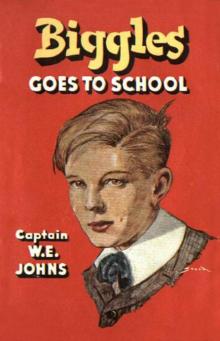 39 Biggles Goes To School
39 Biggles Goes To School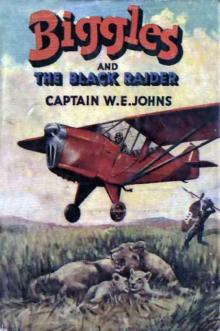 44 Biggles and the Black Raider
44 Biggles and the Black Raider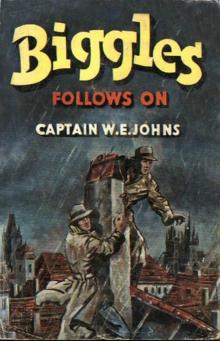 42 Biggles Follows On
42 Biggles Follows On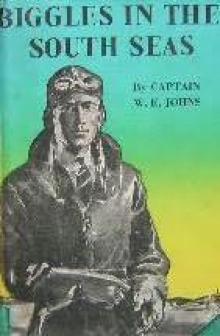 Biggles In the South Seas
Biggles In the South Seas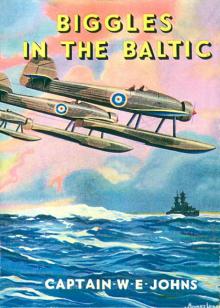 21 Biggles In The Baltic v3
21 Biggles In The Baltic v3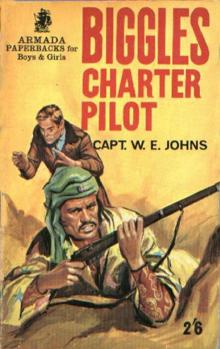 27 Biggles - Charter Pilot
27 Biggles - Charter Pilot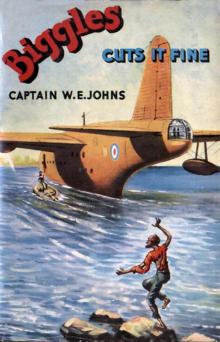 49 Biggles Cuts It Fine
49 Biggles Cuts It Fine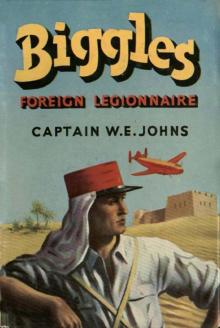 51 Biggles Foreign Legionaire
51 Biggles Foreign Legionaire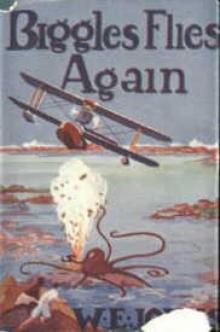 04 Biggles Flies Again
04 Biggles Flies Again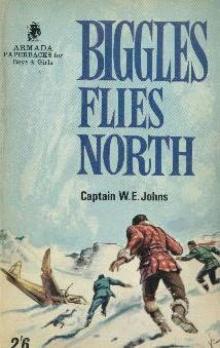 16 Biggles Flies North
16 Biggles Flies North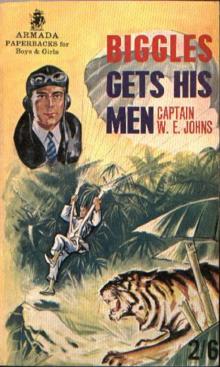 37 Biggles Gets His Men
37 Biggles Gets His Men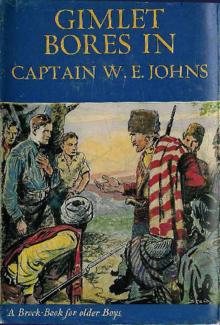 07 Gimlet Bores In
07 Gimlet Bores In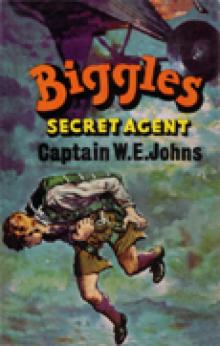 19 Biggles Secret Agent
19 Biggles Secret Agent 32 Biggles In The Orient
32 Biggles In The Orient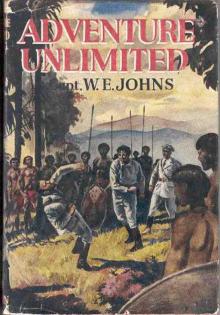 Adventure Unlimited
Adventure Unlimited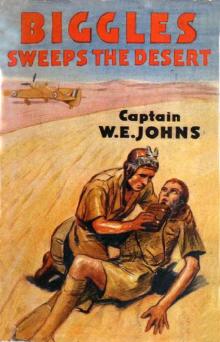 26 Biggles Sweeps The Desert
26 Biggles Sweeps The Desert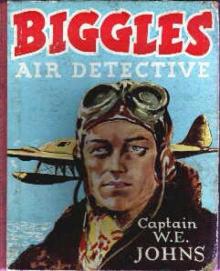 Biggles Air Detective (43)
Biggles Air Detective (43) 36 Biggles Breaks The Silence
36 Biggles Breaks The Silence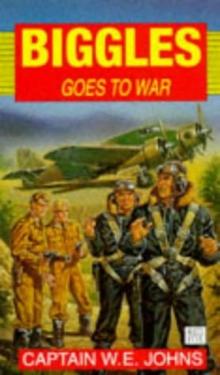 14 Biggles Goes To War
14 Biggles Goes To War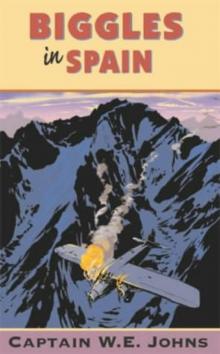 18 Biggles In Spain
18 Biggles In Spain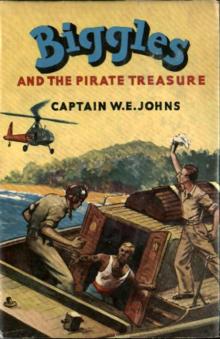 50 Biggles and the Pirate Treasure
50 Biggles and the Pirate Treasure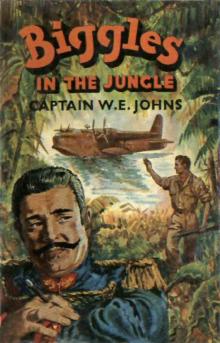 25 Biggles In The Jungle
25 Biggles In The Jungle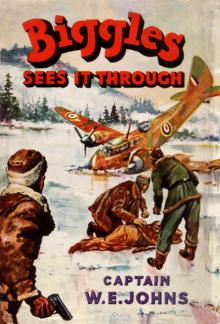 23 Biggles Sees It Through
23 Biggles Sees It Through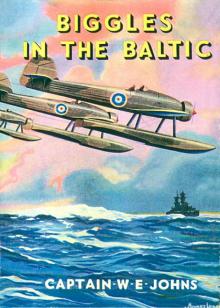 21 Biggles In The Baltic
21 Biggles In The Baltic 24 Spitfire Parade
24 Spitfire Parade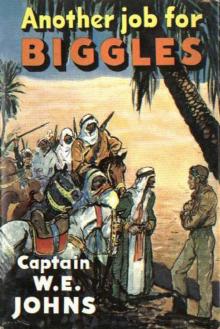 38 Another Job For Biggles
38 Another Job For Biggles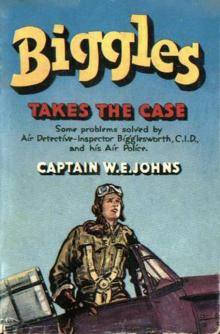 41 Biggles Takes The Case
41 Biggles Takes The Case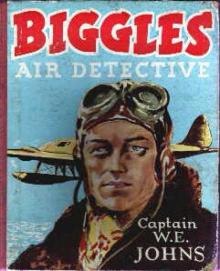 43 Biggles Air Detective
43 Biggles Air Detective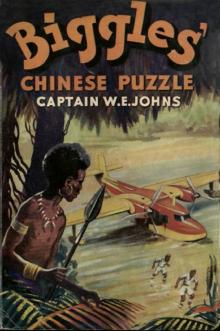 53 Biggles Chinese Puzzle
53 Biggles Chinese Puzzle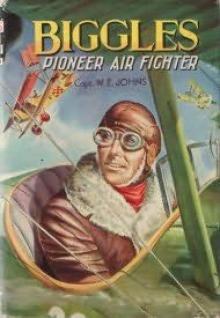 Biggles Pioneer Air Fighter (51)
Biggles Pioneer Air Fighter (51)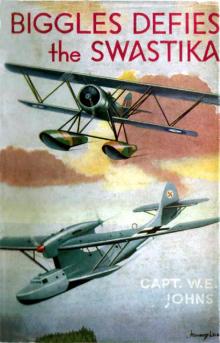 22 Biggles Defies The Swastika
22 Biggles Defies The Swastika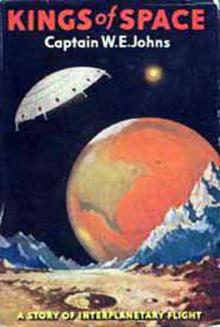 01 Kings Of Space
01 Kings Of Space